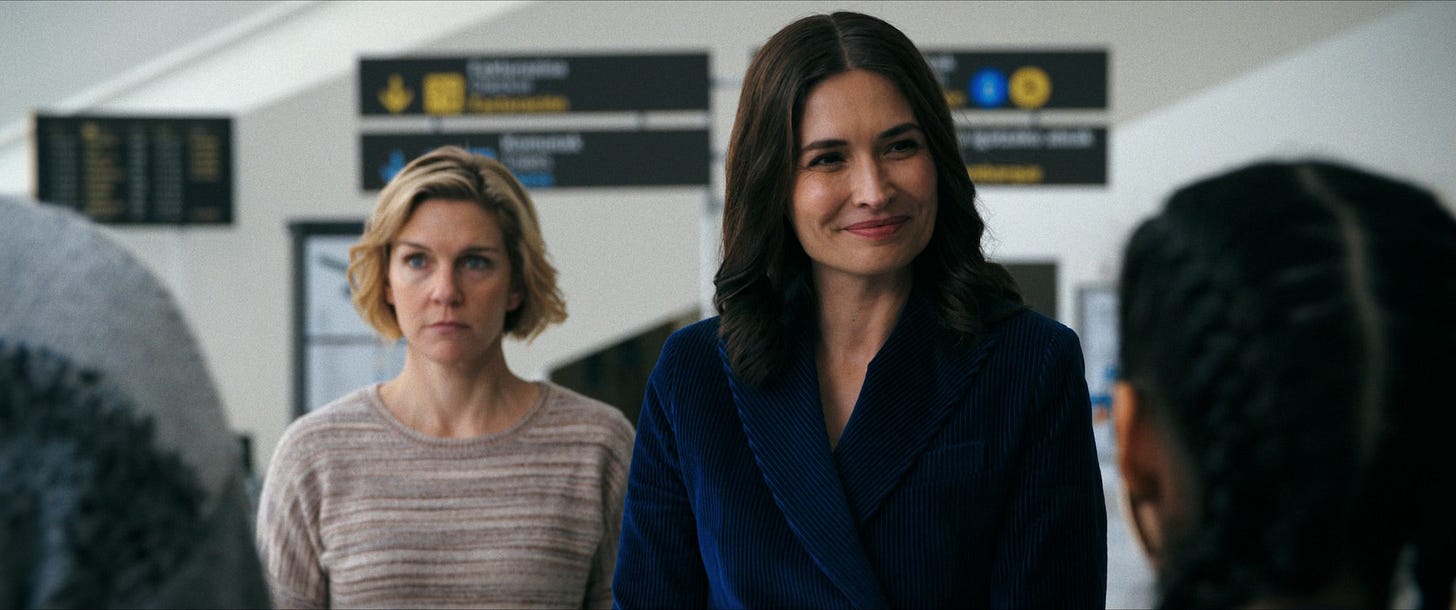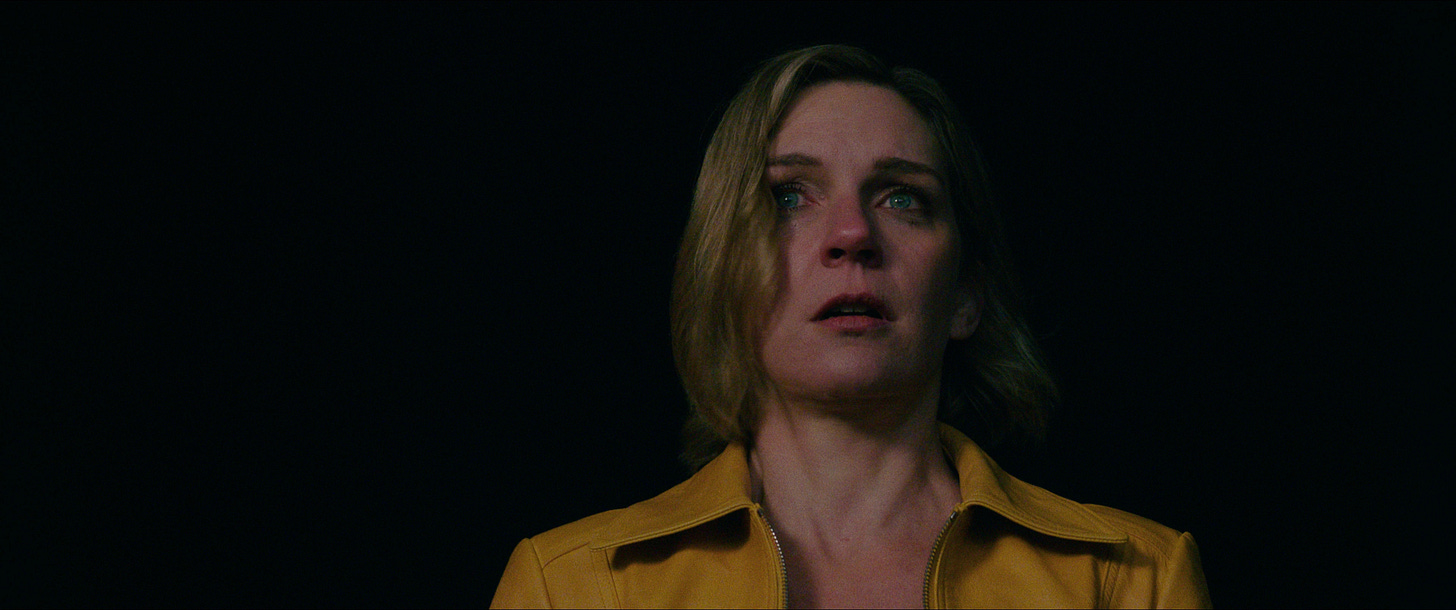Pluribus S1E01 & S1E02 Review | “We Is Us” & “Pirate Lady”
Welcome to the cheerful apocalypse.
[Welcome to Decoding TV’s coverage of Pluribus! Pluribus airs every Friday on Apple TV and you can look for Matt Goldberg’s recaps of the latest episode here on the same day. This review contains spoilers for the first two episodes, “We Is Us” and “Pirate Lady”]
Apple TV has worked to keep the premise of Pluribus, the new series from Breaking Bad and Better Call Saul showrunner Vince Gilligan, heavily under wraps. The marketing has been purposefully circumspect, only revealing that there is an upset woman named Carol (Rhea Seehorn), everyone knows about her, and they just want her to be happy. Once you get the “how” of Pluribus, it’s easy to see why Apple TV endeavored to keep the concept a mystery because, on paper, it sounds a little familiar. Pluribus unabashedly draws from a variety of sci-fi ideas, but, fittingly for this story, it’s not what makes Pluribus like other science fiction stories, but how it’s different. The individuality of the thing matters, and in its first two episodes, Gilligan shows he may have a fresh perspective on soft tyranny.
439 days ago, SETI discovered a unique transmission that was over 600 light-years away. They translated this transmission into an RNA sequence at a military base, but the sequence broke containment, and in the span of roughly 30 days, infected almost all of humanity. The sequence is passed through saliva, and the hive-mind made it a point to get control out through the widest channels possible, ranging from the space station to the South Pole. However, when the military became aware of the plot, the hive had to speed up its plans and take control of as many people as possible. While the beats of such a spread are usually reserved for zombie narratives, this virus discards all individuality in favor of worldwide cooperation (although, as the hive mind says, it’s not really a virus).
However, there are a few people unaffected by the transformation, including our protagonist, romance author Carol Sturka (Seehorn). Before the hive-mind takes total control, we see Carol at a book signing, and she seems quite at home with the rhythm of the work. Her fans are deeply appreciative, she knows how to converse with them, and she also knows when some are getting a little too wrapped up in the book’s world. Later, we see that Carol isn’t thrilled with the way her work is going. She feels trapped by success, and although she’s brought happiness to others, such joy appears to elude her.
When the mass takeover hits, people have a seizure before becoming part of the hive. Carol’s partner and manager, Helen (Miriam Shor), dies after her seizure, as do millions of others. Carol is now both dreadfully alone and surrounded by humanity that wants to make sure she’s comfortable as they work to understand why she and 12 other people on the planet remain unchanged.
The first episode is a terrific tone-setter as the clock ticks down from 439 days to when the population is fully converted into the hive mind. We swap back between “how” and Carol’s life as a good-hearted but unsatisfied romance author until the two plotlines converge in good old Albuquerque (home to Breaking Bad and Better Call Saul), and Carol witnesses the mass transformation first-hand. When Carol sees Helen collapse, it’s probably the best scene in the pilot, not because it’s the most revelatory, but because it’s an opportunity to show Carol as a resourceful individual who will work to find a solution no matter how inelegant it may be. When Carol rushes into the bar to get help, only to find everyone seizing, you can feel Gilligan returning to his days as a writer on The X-Files, and it’s like Mark Snow’s famous theme song is about to kick in. But even amid a terrifying event, Carol uses a sidewalk sign as a gurney to wheel Helen into a pickup and drive her to a local hospital. It’s the kind of scene where you can see Gilligan as a master of his craft. Our main character is in the middle of a global transformation, and yet the scene, from the breathalyzer that Carol can’t beat to her ability to find solutions, is all about character building.
The hive-mind immediately knows Carol is not one of them. However, rather than seizing on her a la Invasion of the Body Snatchers, the hive-mind acts pleasantly banal, like the whole world has become Ned Flanders. As Carol panics about how she’ll get into the rental property, a couple of local kids (now part of the hive mind) helpfully point out that there’s a hide-a-key in a nearby fake rock. The kids know this because they absorbed all of Helen’s memories and knowledge before she died. A terrified Carol hunkers down only to be met on television with an undersecretary of agriculture (also part of the hive mind) who explains what’s happening. They’re not aliens, and it’s kind of like a virus, but not a virus. They mean Carol no harm, but they do want to understand why she wasn’t changed. If she needs anything, just give a ring.
“We Is Us” is a sharp twist on the zombie/invasion story because Gilligan clearly wants to work on an emotional wavelength rather than a physical one. Typically, these stories are about survival. The emotional impact arises out of survival scenarios, so our non-transformed characters are always on the run in an us-vs-them mentality (one can’t help but wonder if Gilligan looked at his AMC contemporary, The Walking Dead, and started thinking up ideas about what he’d do differently). Pluribus, by comparison, stresses that no one is in any physical danger. In one of the more memorable images of a pilot that’s filled with great shots, a scared Carol drives through the streets of Albuquerque only to see the hive-mind population putting out fires and assisting the injured. They’re not a physical threat, but the tension of the show comes from understanding there are other ways to feel threatened.

The second episode, “Pirate Lady,” gets deeper into the idea of the threat and Carol’s growing sense of isolation and alienation. The hive sends Zosia (Karolina Wydra) from the other side of the globe, alters her appearance, and has her serve as a point of contact because they know (from Helen’s memories) that Carol originally wanted the pirate protagonist of her romance novels to be a woman who looks like this rather than the man on the dust jacket. This only unsettles Carol further, at which point the strength of her emotions overpowers the hive mind, causing them to experience convulsions. The hive is bonded by a psychic glue, and if they experience tense, negative emotions, they’ll start having a seizure. While this passes, Zosia informs Carol that people around the globe died because of the convulsions. It’s an important plot beat (as Carol and Zosia dig a literal plot for Helen) because while Carol knows her negative emotions could “defeat” the hive, she doesn’t want to be responsible for countless deaths.
However, she does feel like perhaps there’s an opportunity to turn the tide if she meets with other unaffected individuals. She requests to meet with anyone else who can speak English and isn’t afflicted, and the hive happily sets up a meeting in Spain. However, rather than finding like-minded individuals, Carol discovers that she’s the only one not thrilled by the arrival of the hive-mind. She’s also the only one, aside from Koumba Diabaté (Samba Schutte), who has no one. She has no family, and so taking on the world means something different than a parent or spouse who’s more ambivalent about what it would mean to alter the current status quo. As for Koumba, he’s just happy that there’s an entire planet that has no issue catering to his whims.
This then leads to a question of what it means to be an individual. The hive-mind is pleasant enough, but there’s also a form of erasure here. We get a good example when Carol points out to another unaffected person that her nine-year-old son is now an expert in gynecology by virtue of having all the knowledge on Earth. So, is that still her son? Does that relationship still matter? What does any relationship mean if every person is now one person? That’s the general sense of dread that underlines all the dark comedy present in these first two episodes.
The flipside to this loss of individuality is the loss of all conflict. It’s very much the territory we’ve seen in Angel Season 4 or Peacemaker Season 1, where peace only arrives at the elimination of free will. The hive-mind will not harm a single living creature, but also, when Koumba and Carol both implore Zosia to come with them on separate paths, Zosia says they cannot choose. Choice is an act of free will, and that’s gone now, so all actions must be to the benefit of the hive rather than one of two people with opposing viewpoints. The hive doesn’t meet dissent with violence, but also has no answer for individuality. Everyone must move as one (an idea conveyed beautifully in the pilot by the image of parallel vapor trails).
“Pirate Lady” leaves us in an interesting place where Carol decides to go along for the ride to see where it will take us. It’s a paradoxical ending as returning to Albuquerque will only isolate Carol further, thus hastening (as she believes), the end of humanity. That means the only choice is to join up with Koumba and Zosia to see where the journey goes. As much as everyone is getting on Carol’s nerves, whether they’re unaffected or part of the hive-mind, she’s not giving up on humanity yet.
What makes Pluribus exciting, aside from Seehorn’s outstanding lead performance, is wondering if Gilligan can probe deeper than the intractable problem of free will versus world peace. We recently came out of a pandemic where individual narcissism genuinely got people killed, as those who refused to wear masks and get vaccinated became carriers for a deadly virus. And yet I don’t think anyone would argue that we should shed our individuality for optimal species survival since such survival would be as bland and anodyne as the hive’s personality.
I hope that Pluribus offers no easy answers, and that in exploring what it means to be human in the face of an overwhelming force of conformity, it arrives at some tricky, emotionally thorny places. Gilligan has more than earned the benefit of the doubt for what promises to be a disturbingly pleasant ride.
Stray observations:
One of the things that gives this show a pulse is that Gilligan knows the tropes he’s subverting. “We’ve all seen this movie,” Carol says at one point, and I’m eager to see how Gilligan continues to play against those expectations.
Interestingly, the countdown clock is now ticking up. Part of that feels like a new world order, but the fact that the clock is still running at all feels worth keeping in mind.
I love how well this nails the dark comedy, like everyone having a seizure due to Carol’s negative emotions, and when she tries to help, she just ends up dragging the construction worker across the facade of a building.
“Casanova McBoner.”
Matt Goldberg is a film critic who lives and works in Atlanta. If you enjoyed this review, check out his newsletter, Commentary Track.

